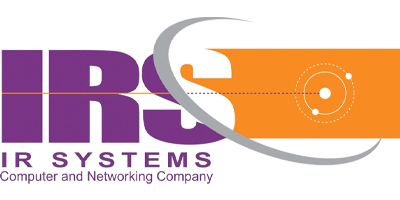How to Use vCloudPoint Devices for Home Cloud?

In today’s digital age, managing files, media, and personal data across multiple devices has become a necessity. Whether you’re working remotely, studying, or simply storing family photos, a home cloud server gives you centralized storage, easy access, and security. But setting up and managing your private cloud doesn’t have to be expensive or complicated. That’s where vCloudPoint devices – such as the vCloudPoint S100V1 and vCloudPoint S100A1 – come in. In this blog, we’ll explore how you can use vCloudPoint devices for home cloud, their benefits, and why they’re becoming a preferred solution in Pakistan. We’ll also show you how IR Systems, an official vCloudPoint importer in Pakistan, can help you get started with your own private my cloud setup. What is vCloudPoint? vCloudPoint is a trusted name in zero client technology. Instead of buying multiple PCs for every family member or home office, you can use vCloudPoint zero client devices connected to a central server. Each device gives the user a personal desktop experience, but all the data, apps, and processing power remain securely on the server. This makes vCloudPoint an affordable and efficient choice for both home and business environments. In Pakistan, solutions like vCloudPoint S100V1 and vCloudPoint S100A1 are widely used for schools, offices, and increasingly for home setups. Why Use vCloudPoint Devices for Home Cloud? Before we dive into the how, let’s cover the why. A home cloud server with vCloudPoint offers: Centralized storage – Store all your media, files, and backups in one place. Secure access – Access your private my cloud securely from any device. Cost savings – Instead of buying multiple PCs, one server plus zero clients handles everything. Scalability – Easily add more vCloudPoint devices in Pakistan as your needs grow. Energy efficiency – Zero clients consume much less power compared to traditional PCs. For families, this means each member can have their own desktop environment without needing separate bulky hardware. For remote workers and students, it ensures access to shared files and applications 24/7. Key vCloudPoint Devices for Home Cloud Here are two of the most popular models you should consider: 1. vCloudPoint S100V1 (V1 vCloudPoint) The S100V1 is a compact, lightweight zero client designed for reliable and energy-efficient performance. Perfect for homes, it ensures smooth access to your home server without lag. Key Features: Ultra-low power consumption No OS, no maintenance needed Compact and silent design Centralized management 2. vCloudPoint S100A1 (A1 vCloudPoint) The S100A1 offers slightly enhanced performance and modern connectivity. It’s ideal for users who want a simple, plug-and-play zero client solution for their home cloud setup. Key Features: HDMI and VGA support USB ports for peripherals User-friendly and cost-effective Designed for multimedia-rich environments Both models integrate seamlessly into your home network, helping you build an affordable and efficient private cloud system. How to Set Up vCloudPoint Devices for Home Cloud Now let’s break down the process of setting up your home cloud server with vCloudPoint. Don’t worry – it’s easier than you think. Prepare Your Central Server Choose a reliable server PC or small NAS with enough storage to act as your central hub. Install your preferred server OS (Windows or Linux). Configure shared folders for documents, photos, and media. Connect vCloudPoint Devices Plug your vCloudPoint S100V1 or S100A1 into a monitor, keyboard, and mouse. Connect the device to your home network via Ethernet. Ensure your server and vCloudPoint device are on the same network. Install vMatrix Server Manager vCloudPoint devices use vMatrix Server Manager software to manage user desktops. Install this software on your central server. Add new user accounts for each family member or user in your home. Log In and Personalize Each family member logs into their personal account using the vCloudPoint device. Users can access their files, applications, and settings independently. All data remains stored centrally on the home server, ensuring security and backup. Enable Remote Access (Optional) For advanced use, configure your router to allow secure remote access. This way, you can access your private my cloud from outside your home – ideal for remote work or traveling. Benefits of Using vCloudPoint for Home Cloud Here’s what makes vCloudPoint stand out from other solutions: Cost Efficiency Buying multiple PCs is expensive. With one server and zero client devices, you save money upfront and on maintenance. Energy Savings Each zero client consumes only a fraction of the power of a traditional desktop, lowering your electricity bill. Easy Maintenance Since there’s no OS or local storage on vCloudPoint devices, there’s no risk of viruses or corrupted files on the clients. All updates are managed centrally on the server. Scalable Solution Need more users? Just add more vCloudPoint devices in Pakistan without buying extra PCs. User-Friendly Even if you’re not tech-savvy, vCloudPoint devices are easy to set up and manage. Why Choose IR Systems for vCloudPoint in Pakistan? When it comes to buying genuine vCloudPoint devices in Pakistan, choosing the right partner is crucial. IR Systems is a trusted vCloudPoint importer in Pakistan, offering original devices like the S100V1 and S100A1. Here’s why you should choose IR Systems: Official importer and distributor of vCloudPoint Competitive pricing for Pakistani customers Expert advice and technical support Quick delivery across Pakistan Tailored solutions for both home and business setups With IR Systems, you’re not just buying a product – you’re getting a complete solution backed by professional support. Practical Uses of a Home Cloud with vCloudPoint Still wondering how this setup helps at home? Here are some real-life examples: Family media hub – Stream movies, photos, and music to any connected device. Student study zone – Centralized storage for assignments, projects, and research. Remote work station – Securely access office files and apps from your home. Personal backup server – Keep all your important data safe and recoverable. Shared home office – Multiple family members working on separate desktops simultaneously. Conclusion Setting up a home cloud server doesn’t have to be expensive or complicated. With vCloudPoint devices like the S100V1 and S100A1, you can create a reliable,
Why Asustor NAS is the Best Enterprise Storage Solution
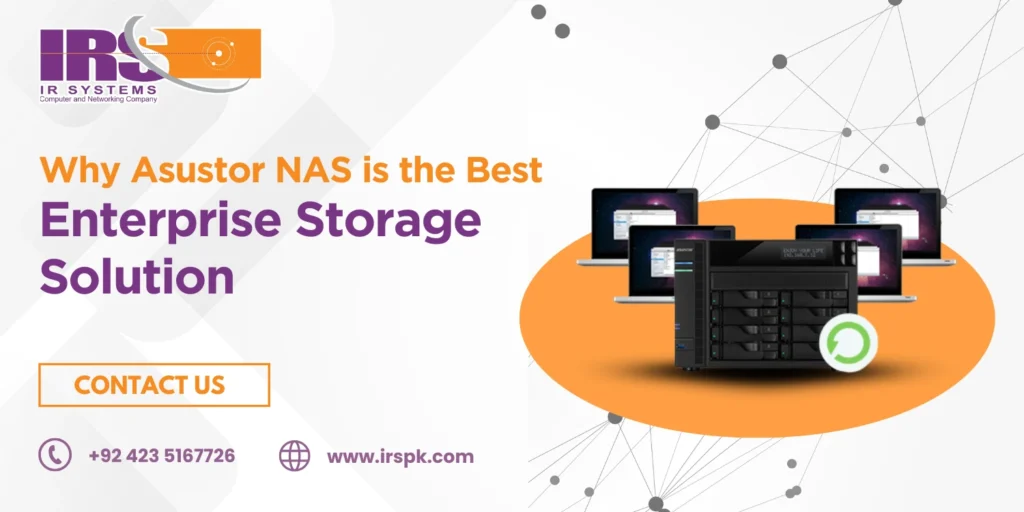
In today’s digital age, data is the backbone of every business. Enterprises need reliable, secure, and scalable solutions to store and manage their growing data. That’s where Asustor NAS storage comes in. Known for its advanced performance, ease of use, and enterprise-ready features, Asustor has quickly become one of the top choices for businesses worldwide. In this blog, we’ll explain why Asustor NAS is the best enterprise storage solution, highlight its benefits for organizations, discuss why companies prefer Asustor in Pakistan, and look at models like the powerful Asustor 6704T. We’ll also touch on related essentials like patch cords, slim flat cables, and 10Gb patch cables that ensure smooth connectivity for enterprises. By the end, you’ll understand why businesses trust Asustor NAS storage and how IR Systems can help you implement it effectively. What Makes Asustor NAS Storage Stand Out? Asustor, a leading brand in the NAS (Network Attached Storage) industry, has earned its reputation for delivering storage solutions that balance performance, reliability, and affordability. Unlike traditional storage devices, Asustor NAS storage offers businesses a centralized way to store, manage, and share data across multiple users and departments. Some standout features include: High scalability – Easy to expand as your data grows. Top-notch security – Advanced encryption and backup features protect business-critical data. User-friendly interface – Even IT teams with limited storage expertise can manage Asustor devices effortlessly. Cross-platform support – Works seamlessly with Windows, macOS, Linux, and mobile platforms. Why Enterprises Choose Asustor NAS Storage Enterprise data needs are complex, and Asustor caters directly to these requirements. Here’s why businesses worldwide and in Pakistan prefer Asustor: Enhanced Data Security For any enterprise, data security is a top priority. Asustor NAS storage comes equipped with multiple layers of defense: AES-256 bit encryption Two-step verification Snapshot technology to prevent ransomware attacks These features ensure your sensitive data is always protected. Seamless Scalability Businesses grow, and so does their data. With Asustor NAS storage, you don’t need to worry about running out of space. Enterprises can add more drives or upgrade models like the Asustor 6704T to meet increasing data demands. High-Speed Performance With enterprise-grade hardware, Asustor NAS storage provides lightning-fast read and write speeds. When paired with 10Gb patch cables and slim flat cables, businesses can ensure smooth, uninterrupted connectivity and data transfers across their networks. Centralized Data Access No matter the size of your organization, Asustor allows teams to access, share, and collaborate on data from anywhere. This centralized approach improves workflow and reduces data silos within enterprises. Why Asustor in Pakistan is Growing in Demand The demand for Asustor in Pakistan is rapidly increasing as businesses recognize the importance of investing in reliable NAS solutions. From SMEs to large enterprises, organizations across industries are turning to Asustor NAS storage for: Cost-effective storage compared to traditional servers. Ease of implementation by local distributors like IR Systems, who provide professional support. Future-proof technology that aligns with Pakistan’s growing digital transformation goals. Whether you’re looking for entry-level NAS devices or advanced models like the Asustor 6704T, the right solutions are now easily available through trusted Asustor NAS distributors in Pakistan. Spotlight on Asustor 6704T – A Powerhouse for Enterprises Among Asustor’s lineup, the Asustor 6704T stands out as one of the best enterprise solutions. Here’s why: 4-bay design – Supports multiple drives for greater storage capacity. 10GbE connectivity – Ensures ultra-fast data transfers. Powerful Intel processor – Handles multiple enterprise tasks with ease. Expandable memory – Ideal for businesses that need scalability. This device is perfect for medium to large enterprises looking for robust performance and reliability. With patch cords and slim flat cables, businesses can easily integrate the Asustor 6704T into their existing IT infrastructure without bottlenecks. The Role of Patch Cords, Slim Flat Cables, and 10Gb Patch Cables While NAS devices are the core of enterprise storage, the supporting accessories play a vital role too. Patch Cords – Ensure strong and reliable connectivity between network devices. Slim Flat Cables – Save space, improve airflow in server racks, and reduce clutter. 10Gb Patch Cables – Unlock the full potential of high-performance NAS devices like the Asustor 6704T, providing ultra-fast transfer speeds. When paired with Asustor NAS storage, these accessories optimize enterprise performance and efficiency. Benefits of Choosing IR Systems for Asustor NAS in Pakistan When it comes to implementing Asustor NAS in Pakistan, choosing the right distributor matters. At IR Systems, we specialize in providing businesses with tailored solutions. Here’s why enterprises trust us: Authorized Asustor distributor in Pakistan Expert consultation for businesses of all sizes Professional installation and support services Access to the latest models like the Asustor 6704T Complete enterprise networking solutions including patch cords, slim flat cables, and 10Gb patch cables We work closely with our clients to design storage setups that meet their exact needs. Why Asustor NAS Storage is the Future of Enterprise Data Enterprises can no longer rely on outdated or fragmented storage solutions. With increasing data loads, cybersecurity threats, and the need for collaboration storage provides the perfect balance of performance, security, and affordability. As businesses continue to digitize operations, solutions like the Asustor 6704T paired with enterprise-grade accessories will ensure smooth scalability and uninterrupted growth. Conclusion Choosing the right storage solution can make or break an enterprise’s efficiency. With Asustor NAS storage, businesses get: Reliable and secure data protection Scalable solutions for future growth High-speed performance with 10Gb support Centralized collaboration and access Whether you’re a growing SME or a large enterprise, Asustor NAS offers the flexibility and power you need. At IR Systems, we’re proud to be a trusted partner for Asustor in Pakistan, helping businesses unlock the full potential of their data. Ready to transform your enterprise storage with Asustor? Contact IR Systems today and let’s build the perfect solution for your business.
How Secure Is NAS Storage for vCloudPoint S100V1?
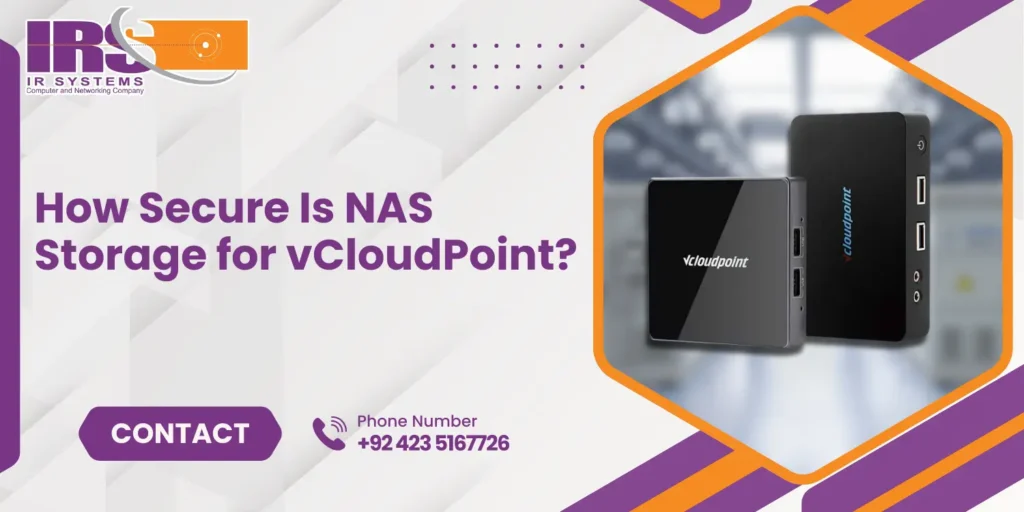
In today’s fast-moving digital environment, businesses need smarter, cost-effective ways to manage computing without sacrificing speed or security. Whether you’re equipping workstations in a school, call center, or office, the need for simplified, high-performance infrastructure is universal. That’s where the vCloudPoint S100V1, offered by IR Systems, becomes a game-changer, offering centralized computing that drastically cuts hardware costs while delivering a seamless user experience. Compact yet powerful, the vCloudPoint S100V1 is a zero client endpoint designed to streamline how organizations deploy and manage terminals. When integrated with advanced NAS storage solutions in Pakistan, it enables secure, scalable data access, effortless backup, and centralized content management across all users. This blog explores what makes the S100V1 ideal for 2025, including its key specs and the benefits of pairing it with NAS systems to future-proof your IT environment. What Is the vCloudPoint S100V1? The vCloudPoint S100V1 is a zero client device – meaning it doesn’t function as a standalone computer but rather connects to a central server where all computing power resides. Each user accesses a virtual session via this endpoint, eliminating the need for separate PCs. Here’s why it’s so impactful: Reduces upfront hardware investment Minimizes maintenance and upgrade needs Ensures secure, centralized data control Perfect for multi-user environments like schools, libraries, training centers, and offices Compact but Mighty: vCloudPoint S100V1 Specs Despite its minimal footprint, the vCloudPoint S100V1 is packed with features that support modern display, connectivity, and remote usage needs. Feature Details Model V1 Dimensions 93(W) x 90(D) x 18(H) mm Weight 150g Color Diamond Black & Moon Silver Video Output 1x HDMI, 1x VGA USB Ports 4x USB 2.0 Network 1x RJ45 (LAN), Wi-Fi supported Power 5V DC input Switch Power/Reset Combo Security Anti-theft gadget Display Support HDMI / VGA – 32-bit @ 60Hz (Standard/Wide) Certifications FCC, CE, CCC, ROHS, BIS, NOM, ISO 9001:2015, ISO 14001:2015 Whether you’re setting up 5 or 500 workstations, the V1 makes it easy to deploy, scale, and maintain. How It Integrates with NAS Storage With all computing sessions being centrally hosted, it’s vital to ensure data is accessible, backed up, and secure, which is where IR Systems’ NAS solutions come in. Here’s how NAS + vCloudPoint = the perfect match: Centralized File Management: Users access and save files in a shared NAS, eliminating silos and syncing issues. Secure Backup Data Storage: All user data remains protected via scheduled NAS backups, ensuring nothing is lost even in the event of user error. Efficient Server Cloud Backup: Combine on-site NAS storage with cloud backup to ensure maximum data resilience and continuity. Fast Read/Write Access: With high-speed networking and modern NAS solutions for enterprise, users experience real-time responsiveness even during peak usage. This combo is especially effective for businesses that run on shared files, client-server applications, or require remote session storage. Key Benefits for Businesses Whether you’re a growing startup or an enterprise aiming for streamlined IT infrastructure, the vCloudPoint S100V1 offers serious advantages: 1. Reduced Costs Forget the need to purchase individual PCs. The V1 lets you deploy multiple workstations for the price of one decent desktop. 2. Simplified Management All software updates, file access, and security patches are managed centrally, saving your IT team time and headaches. 3. Enhanced Security With the anti-theft gadget and ISO-certified hardware, the vCloudPoint S100V1 ensures your environment meets modern compliance standards. 4. Energy Efficiency At just 5V input and ultra-low power consumption, it’s an eco-friendly solution that reduces energy bills and your carbon footprint. 5. Flexibility Across Environments Whether it’s a school computer lab, a healthcare admin office, or a training centre, the S100V1 is adaptable, scalable, and user-friendly. Ideal Use Cases Educational Institutions: Deploy hundreds of user terminals in classrooms or labs, managed from a central IT desk. Small Businesses: Use S100V1 with NAS for accounting, HR, CRM access, and internal collaboration. Call Centers: Reduce hardware investment while giving agents stable access to cloud-based tools. Public Sector: Secure, cost-effective computing for government departments and training institutes. If you need centralized control, multi-user support, and reliable data access – this is the solution. Why Choose IR Systems? At IR Systems, we’re more than just tech providers – we’re your technology partners. We understand that every organization has different needs, and our goal is to deliver tailored solutions that grow with you. What You Can Expect: Expert advice on integrating vCloudPoint with NAS storage Full system deployment, setup, and user training Reliable support and future upgrades Scalable NAS storage solutions that match your performance needs With years of experience in server, cloud, and backup storage technology, we ensure that your IT infrastructure is secure, efficient, and future-ready. Final Thoughts: Simplify Computing Without Compromise In 2025, agility and security are everything. With the vCloudPoint S100V1 zero client and IR Systems’ NAS storage solutions, you’re not just simplifying hardware – you’re future-proofing your business. This compact device is proof that big things come in small packages. Whether you’re building a smart office or a virtual learning environment, the S100V1 delivers on performance, affordability, and user experience. Ready to Transform Your Workspace? Let’s talk! Contact IR Systems today to schedule your free consultation and discover how vCloudPoint S100V1 and our custom NAS solutions can revolutionize your business operations.
Top SAN Storage & Network Devices for Cloud Backup in 2025
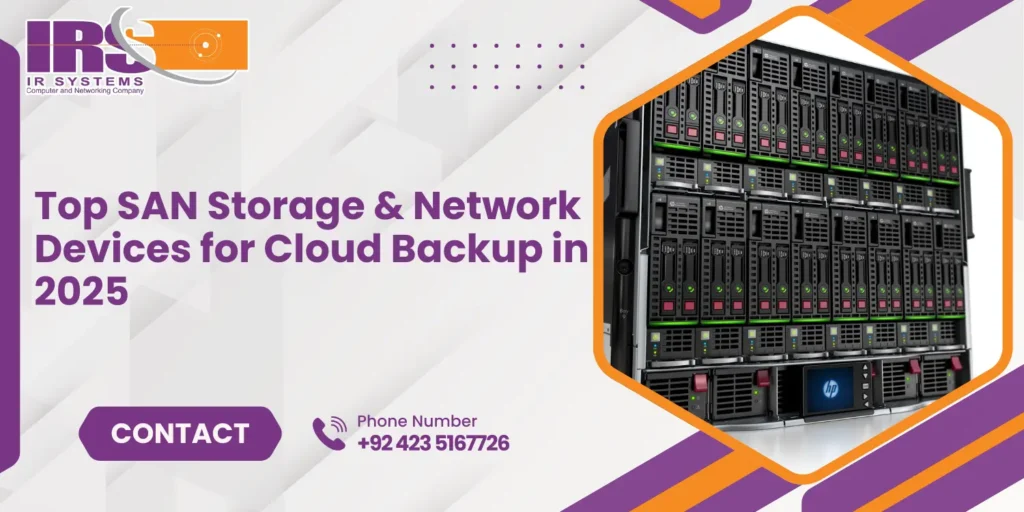
In the digital age, data is the backbone of every business. Whether you’re a startup or an established company, the need for secure, fast, and scalable data storage has never been greater. SAN storage (Storage Area Network) is rapidly becoming the go-to solution for businesses aiming to protect and manage their data efficiently. At IR Systems, we specialize in providing cutting-edge NAS storage and SAN storage solutions designed to meet the unique needs of modern businesses. In this blog, we’ll explore the best SAN storage and storage area network devices for server cloud backup, and how these solutions can transform your data management strategy. Why SAN Storage Matters? SAN storage is a high-performance, dedicated network that connects servers to storage devices. Unlike traditional storage methods, SAN provides block-level storage, ensuring faster data access and seamless data transfers. Key Advantages of SAN Storage: Blazing-Fast Data Speeds: Perfect for real-time data processing and backup. Centralized Storage: Manage all your data from a single point. High Scalability: Easily expand your storage capacity as your business grows. Robust Backup Support: SAN integrates effortlessly with cloud backup systems. Understanding Storage Area Network Devices When building a SAN storage system, the storage area network devices you choose make all the difference. These are the core components that power your SAN network. Essential SAN Devices: Disk Arrays: High-capacity storage units designed for speed and redundancy. Fibre Channel Switches: Enable rapid and reliable communication between servers and storage devices. Storage Controllers: Manage data flow, prevent bottlenecks, and ensure optimal performance. With the right mix of these devices, you can create a high-speed, reliable network perfect for server cloud backups. The Power of Server Cloud Backup A server cloud backup is essential for modern businesses. Unlike local backups that are vulnerable to system failures and physical damage, cloud backups offer safe, remote storage with real-time access. Benefits of Server Cloud Backup: Automatic Backups: Schedule backups to run without manual intervention. Remote Access: Retrieve your data from anywhere, anytime. Disaster Recovery: Quickly restore your systems in the event of data loss. Data Security: Cloud providers offer encryption and multiple layers of protection. By combining SAN storage with server cloud backup, you get the best of both worlds – lightning-fast local storage and safe, off-site data protection. Top SAN Storage Devices to Consider in 2025 Choosing the right storage solution is critical. Here are some top SAN storage devices that are trusted for cloud backup efficiency and business performance: 1. QSAN XCubeSAN XS5316 An excellent mid-range SAN storage solution perfect for growing businesses. 16-bay capacity for flexible storage Supports hybrid flash systems for better speed Ideal for medium to large data centers 2. QSAN XCubeSAN XS5326 A powerhouse for businesses with heavy data loads. 26-bay scalable design Enhanced data protection for cloud backups Fast data processing speeds 3. Infortrend GS4024U Known for its reliability and impressive storage capacity. High-density storage arrays Seamless cloud integration Strong disaster recovery support These devices provide the perfect foundation for SAN storage and offer excellent support for server cloud backup solutions. Asustor NAS Storage Systems: Flexible and Affordable Solutions While SAN storage is essential for high-demand environments, Asustor NAS storage systems provide an excellent option for small to mid-sized businesses seeking flexibility and affordability. Benefits of Asustor NAS: User-Friendly Interface: Easy to manage, even without IT expertise. Hybrid Cloud Backup: Supports both local and cloud storage. Cost-Effective: Provides excellent value without compromising security. Expandable Storage: Easily add more drives as your data grows. Asustor NAS storage is especially useful for businesses that want simple server cloud backup solutions without the complexity of large SAN setups. NAS Storage for Small Businesses: Why It Works At IR Systems, we frequently recommend NAS storage to small businesses that need: Affordable backup solutions Secure file-sharing across teams Cloud integration without a steep learning curve NAS storage offers a practical entry point into the world of secure backups while providing the flexibility to grow as your business expands. How IR Systems Can Support Your Storage Needs At IR Systems, we offer more than just storage products – we provide tailored storage solutions that fit your business perfectly. Whether you need a high-speed SAN setup, a simple NAS system, or a hybrid cloud backup, our team is here to help you every step of the way. Why Partner with IR Systems? Proven experience in SAN and NAS storage solutions Fast and reliable customer support Customized storage planning based on your specific needs We work closely with you to ensure you get the right mix of speed, security, and scalability. Secure Your Data and Your Future In today’s competitive world, protecting your data is protecting your business. Investing in SAN storage, storage area network devices, and server cloud backup solutions will not only boost your performance but also keep your valuable information safe and accessible. At IR Systems, we’re committed to helping you build reliable and scalable storage solutions that grow with your company. Contact Us for Expert Storage Solutions Ready to take your data security to the next level? Contact us today for expert advice on SAN storage, NAS storage, and server cloud backup solutions. Let’s create a system that keeps your data safe, secure, and always within reach.
Why Asustor NAS Storage Is Your Best Backup Solution
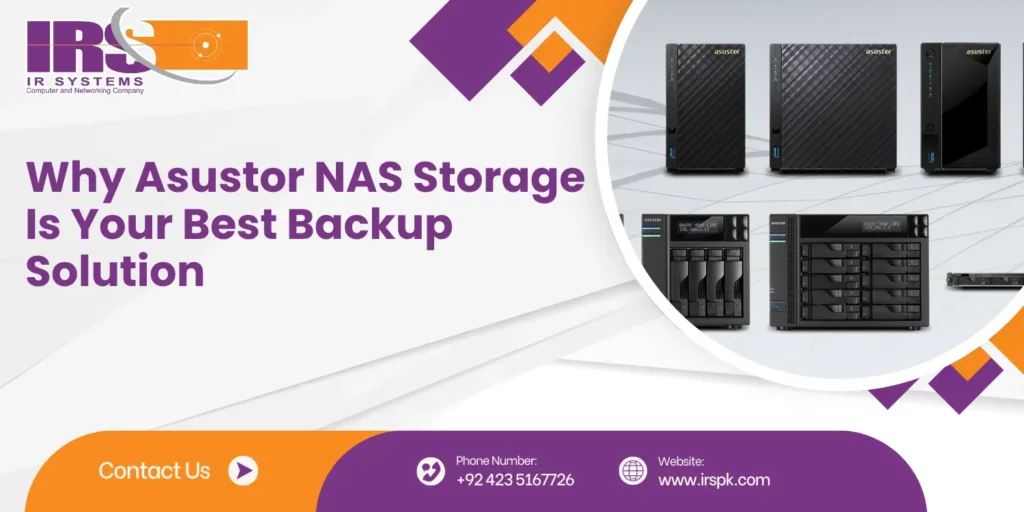
In today’s digital-first world, data is the backbone of every business – and losing it is simply not an option. Whether you’re a small startup or a growing enterprise, data backup is one of the most critical parts of your IT strategy. That’s where Asustor NAS storage steps in – a smart, secure, and scalable solution trusted by professionals around the globe. At IR Systems, we specialize in modern NAS storage solutions, and we’ve seen firsthand how Asustor helps businesses across Pakistan stay protected, productive, and ready for the future. In this blog, we’ll explore why Asustor NAS storage systems are becoming the go-to choice for backup data storage, how they support server cloud backup, and how they can transform your backup strategy – without breaking your budget. Why Should You Care? Asustor is a leading name in the NAS (Network Attached Storage) space, known for delivering high-performance, user-friendly, and reliable storage solutions. NAS is essentially a storage server that connects directly to your network, making it easy to access, share, and secure your data from multiple devices. What makes Asustor NAS storage different is its blend of powerful hardware, intuitive interface, and advanced data protection features – all wrapped in a cost-effective package. If you’re tired of juggling USB drives, external hard disks, or worrying about ransomware attacks, an Asustor NAS might be exactly what your business needs. Why Businesses Need NAS for Backup Data Storage Imagine this: one of your team members accidentally deletes a key client file, or your main server crashes due to a power surge. Without a robust backup system, that data might be gone forever. This is where backup data storage using Asustor NAS systems becomes essential. Top Benefits of Using NAS for Backups: Automatic and Scheduled Backups Set it and forget it. Asustor lets you automate backups on a schedule that suits your needs – daily, weekly, or even hourly. RAID Support for Redundancy Asustor NAS supports various RAID levels, meaning your data is mirrored across multiple drives. If one fails, you don’t lose your information. Remote Access and Server Cloud Backup Access your files from anywhere, anytime – whether you’re at home, in the office, or on the move. Asustor supports integration with public cloud services like Google Drive, Dropbox, OneDrive, and more. Military-grade Encryption Keep sensitive business data secure with built-in encryption and multi-level access control. How Asustor NAS Storage Systems Stand Out There are many NAS brands out there, so why are businesses choosing Asustor? Let’s take a closer look at the features that set it apart. 1. User-Friendly Interface The ADM (Asustor Data Master) operating system is sleek and intuitive – even for non-technical users. You don’t need an IT background to manage your files or set up a backup job. 2. Fast Performance With powerful CPUs and expandable RAM, Asustor devices deliver lightning-fast read/write speeds – even when multiple users access data simultaneously. 3. Expandable Storage Start small and grow big. Asustor NAS systems allow you to add more drives as your storage needs increase. 4. Energy Efficient Asustor NAS devices consume less power than traditional servers, making them a green and cost-effective backup solution. 5. Cloud Integration Hybrid cloud support gives you the best of both worlds – on-premise speed and cloud flexibility. It’s ideal for server cloud backup strategies. Real-World Use Cases: How Businesses Use Asustor At IR Systems, we’ve implemented Asustor NAS storage systems across various industries. Here are a few examples of how different sectors benefit: Healthcare Providers Securely store patient records, appointment histories, and lab reports with full compliance. Asustor’s encryption and access controls ensure sensitive data stays protected. Retail and E-Commerce Manage inventory files, sales records, and customer data centrally. Sync with cloud services for added redundancy. Educational Institutions Back up course material, student records, and administrative documents in one place – accessible to staff from anywhere. Small Businesses and Freelancers Affordable, secure, and easy to use. Even solo entrepreneurs can benefit from automatic data backups and secure remote access. Asustor and Server Cloud Backup – A Perfect Match One of the best features of Asustor is its seamless support for server cloud backup. This hybrid approach combines the safety of local NAS with the scalability of cloud storage. You can back up critical data to your NAS and then set up automated synchronization with services like: Amazon S3 Dropbox Microsoft Azure Google Drive OneDrive This gives you double protection – even if your local NAS faces issues, your data is still safe in the cloud. Why Choose IR Systems for Your Asustor NAS Setup? Choosing the right NAS is just the first step. Setting it up properly, securing it, and optimizing it for your needs is where the real value comes in – and that’s where we help. At IR Systems, we don’t just sell storage solutions. We design, install, and manage complete data protection strategies tailored for your business. What You Get with IR Systems: Expert consultation to choose the right Asustor NAS model RAID setup and performance optimization Cloud backup configuration Ongoing support and updates Friendly, local service you can trust We’ve helped businesses across Pakistan protect their data, reduce downtime, and achieve peace of mind – and we’d love to help you too. Final Thoughts: Back Up Smart with Asustor & IR Systems In a time where data is your most valuable asset, there’s no room for uncertainty. Asustor NAS storage offers a powerful, secure, and budget-friendly way to safeguard your files, support remote work, and integrate seamlessly with your cloud backup strategy. Whether you’re a small team or a growing enterprise, you deserve backup systems that work reliably and effortlessly. Let IR Systems be your trusted partner in building a smart, secure, and scalable backup solution with Asustor. Ready to Back Up with Confidence? Protect your business the smart way. Contact IR Systems today for a free consultation and let us help you choose the best Asustor NAS solution for your backup needs.
Best NAS Storage & Backup Solutions in Pakistan
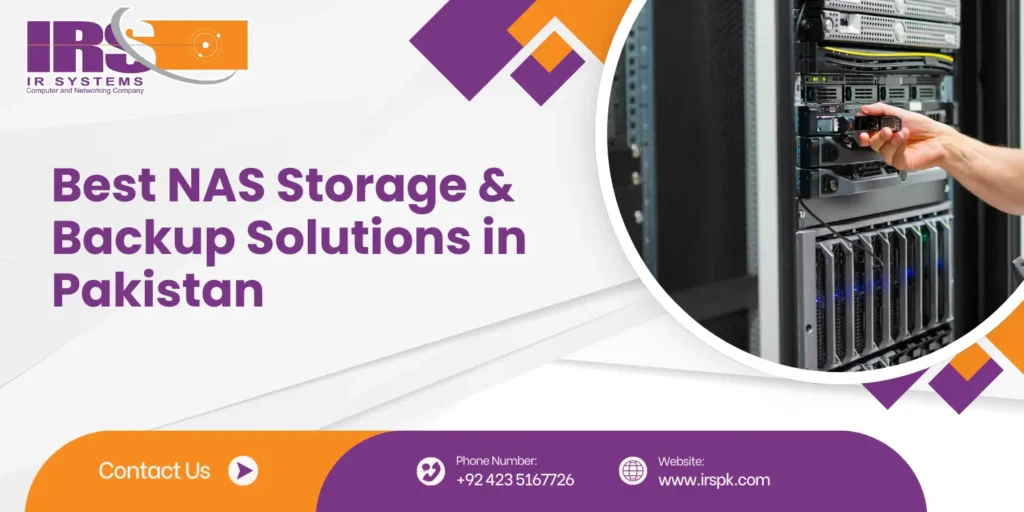
In today’s fast-moving digital world, managing and securing data efficiently is critical for every business. Whether you’re a startup, a mid-sized company, or a large enterprise, you need reliable storage that can grow with your data demands. That’s where NAS Storage (Network-Attached Storage) steps in – offering businesses in Pakistan a robust, flexible, and secure way to store, manage, and back up their valuable information. At IR Systems, we specialize in providing the most advanced NAS storage solutions and backup systems tailored for organizations across industries. In this blog, we’ll explore what NAS storage is, how it benefits businesses, and why choosing the right backup solutions in Lahore and beyond is more important than ever. Why Does It Matter? NAS (Network-Attached Storage) is a dedicated data storage device connected to a network that allows multiple users and client devices to retrieve data from centralized disk capacity. Unlike traditional storage systems, NAS is designed for easy access, secure sharing, and seamless backup – making it a favorite among modern businesses. Key Advantages of NAS Storage: Centralized file sharing Scalable storage capacity Automated backups Enhanced data security Remote accessibility Low maintenance Whether you are a creative agency managing large media files or a law firm handling sensitive client documents, NAS solutions provide a dependable and organized system for storing and retrieving data. Why Businesses in Pakistan Need NAS More Than Ever With data growing at unprecedented rates and cyber risks on the rise, businesses across Pakistan – especially in urban centers like Lahore – need smarter ways to store and secure information. Local companies are increasingly turning to NAS storage not just as a place to save files but as a complete data management system. Here’s why: Growing digital transformation in sectors like healthcare, education, e-commerce, and finance is pushing the demand for secure and accessible data storage. Remote work and hybrid office models require systems that offer real-time collaboration and file access from anywhere. Data protection regulations and compliance requirements demand businesses maintain secure backups and recovery strategies. Backup Solutions in Lahore: Protect What Matters Most A good storage system is incomplete without a reliable backup. Accidents happen – whether it’s a hardware failure, human error, or cyberattack. That’s why businesses in Lahore and beyond are prioritizing strong backup solutions to ensure business continuity. At IR Systems, we deliver customized backup strategies that integrate seamlessly with your NAS setup. Our solutions are designed to provide: Real-time and scheduled backups Version control and file recovery Hybrid storage (on-site + cloud) Fast restore times for minimal downtime For companies handling sensitive data – like schools, clinics, media houses, or logistics providers – our backup solutions in Lahore offer peace of mind and compliance with data protection standards. QNAP NAS Storage: Smart, Reliable, and Scalable One of the leading NAS brands we proudly offer is QNAP NAS Storage – known globally for its smart features, durability, and user-friendly interface. QNAP devices are ideal for businesses of all sizes, and they come equipped with: RAID support for added data redundancy Built-in backup apps and cloud integration User access controls and encryption for security Surveillance station support for office security systems High-speed connectivity for seamless data transfer With QNAP NAS Storage, you’re not just buying a box with drives – you’re investing in a powerful storage ecosystem that boosts productivity and ensures your data is always safe and accessible. Network-Attached Storage Solutions for Every Industry At IR Systems, we understand that no two businesses are the same. That’s why we tailor our network-attached storage solutions to meet the specific needs of your industry. Some of the industries we serve include: Healthcare: Secure patient records, diagnostic imaging files Corporate offices: Centralized document management and team collaboration Media and Production: Store and stream 4K video and audio files Education: Manage student records, lesson plans, and digital classrooms E-commerce: Track product data, transactions, and customer communications Our storage solutions are built for speed, reliability, and data protection – so you can focus on your business, not your server room. Why Choose IR Systems for NAS and Backup Solutions? We’re more than just a tech provider – we’re your long-term data partner. With years of experience delivering premium NAS storage and backup systems in Pakistan, IR Systems is trusted by businesses that value performance, security, and professional support. Here’s what sets us apart: Authorized resellers of top NAS brands like QNAP Custom setup and configuration based on your environment On-site and remote technical support Training and after-sales service Competitive pricing with flexible plans Whether you’re a startup or a growing enterprise, we offer the network-attached storage solutions that fit your budget and future needs. Real Results: What Our Clients Are Saying We had issues with data loss before switching to IR Systems. Their QNAP solution gave us stability, and we’ve never looked back. – CEO, Lahore-Based Marketing Agency Their team walked us through every step, from planning to installation. The remote access feature has been a game changer. – IT Manager, Retail Business in Karachi These stories reflect what we strive for every day: smart, effective, and reliable data solutions that empower Pakistani businesses. Real Success Stories from Local Businesses We’ve worked with startups, retailers, schools, and law firms – each with different data challenges. With the right NAS Storage in place, these businesses have improved workflow, reduced data loss incidents, and enabled secure remote access for their teams. Whether you’re handling customer records, financial reports, or digital media, IR Systems has the right solution for you. Final Thoughts: Secure Your Data, Empower Your Growth In a world where information is currency, investing in the right NAS storage and backup solutions is not just a tech decision – it’s a business strategy. With IR Systems, you gain access to modern, efficient, and scalable storage tailored to your unique needs. Whether you’re based in Lahore, Karachi, Islamabad – or anywhere else in Pakistan – our team is ready to help you take control of your data. Let us design a
Best Backup Solutions for Business with NAS Storage
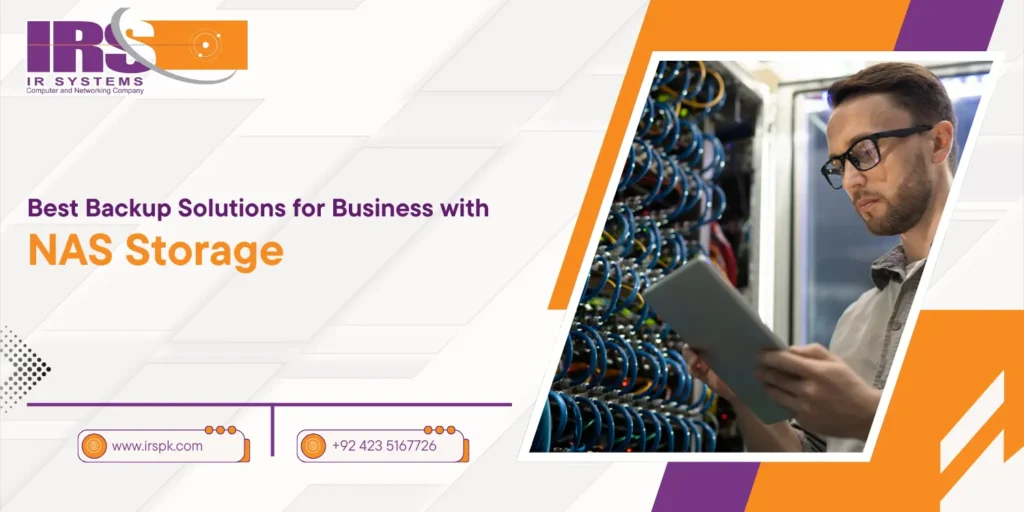
As businesses increasingly rely on data to drive operations, NAS Storage (Network-Attached Storage) has become an essential tool for securing, managing, and accessing critical files. Unlike traditional storage systems, NAS offers centralized, scalable, and user-friendly file sharing across networks, making it ideal for businesses of all sizes. In this guide, we’ll break down everything you need to know about NAS storage—from its types and top benefits to the advantages of using QNAP NAS Storage and finding reliable backup solutions in Lahore. You’ll also learn why NAS storage is vital in today’s digital ecosystem, especially for businesses looking to streamline operations and ensure data security. Understanding NAS Storage: A Business Essential Network-Attached Storage (NAS) is a dedicated file storage system that connects to a network, allowing multiple users and devices to store and retrieve data from a centralized location. NAS operates independently of application servers, offering a more reliable and efficient data management experience. Key Features of NAS: Centralized Storage: All business files are stored in one secure location Multi-User Access: Simultaneous access for teams across departments Remote Accessibility: Secure file sharing from anywhere with internet Data Redundancy: RAID configurations protect against hardware failure Automated Backups: Scheduled backups reduce the risk of data loss By streamlining file access and reducing dependency on physical storage devices, NAS empowers businesses with faster decision-making, better collaboration, and improved data protection. Types of NAS Storage Solutions for Business Choosing the right NAS depends on your organization’s size, data load, and operational needs. Here’s a quick overview of the most common types of NAS solutions: 1. Desktop NAS Compact and affordable, desktop NAS units are perfect for small businesses and startups. These systems offer decent storage capacity and essential features like file sharing, backup, and cloud sync. 2. Rackmount NAS Designed for medium to large enterprises, rackmount NAS systems provide high performance, large storage capacities, and advanced features like virtualization, high-speed networking, and failover protection. 3. High-Availability NAS These models include dual controllers and power supplies, ensuring continuous operation in mission-critical environments like finance, healthcare, and media production. 4. Hybrid Cloud NAS Combining local storage with cloud backup, hybrid NAS solutions give businesses the flexibility to scale storage while keeping data accessible and secure across environments. Why QNAP NAS Storage Stands Out Among the many NAS brands available, QNAP NAS Storage is recognized for its robust performance, advanced features, and user-friendly design. Whether you’re managing a remote workforce or running a data-heavy application, QNAP has solutions tailored for your needs. Advantages of QNAP NAS: Enterprise-Grade Security: AES encryption, firewall, malware protection App Ecosystem: Access to hundreds of business and security apps Virtualization Ready: Supports Docker, LXC, and virtual machines Flexible RAID Support: Safeguards data with options for RAID 1, 5, 6, 10 Snapshot Technology: Instantly recover data in case of accidental changes or ransomware attacks Top QNAP Models for Business: QNAP TS-x64 Series – Ideal for SMBs needing efficiency and scalability QNAP TS-h1283XU-RP – Suitable for enterprises with large workloads and high IOPS demands Whether you’re hosting files, managing databases, or setting up a private cloud, QNAP provides reliable, scalable, and secure storage solutions for every business tier. Backup Solutions in Lahore – Local Support, Global Reliability In regions like Pakistan, particularly in tech-forward cities such as Lahore, demand for data security has led to the rise of reliable backup solutions providers. Many IT firms now offer NAS-based backup solutions in Lahore tailored to meet local business needs while adhering to global standards. Services You Can Expect: NAS-based onsite and offsite backup Data migration and disaster recovery planning Cloud integration for scalable storage 24/7 monitoring and technical support Data encryption and compliance-focused storage Benefits of Choosing Local Backup Services: Faster support and implementation Better understanding of regional regulations Personalized solutions based on industry needs Cost-effective packages for SMEs and enterprises alike Lahore’s tech ecosystem is growing fast, and with it, the availability of professional-grade backup services that prioritize data security and uptime. Benefits of Network-Attached Storage Solutions Implementing network-attached storage solutions offers a range of business advantages that go far beyond just storage. Why Businesses Should Invest in NAS: Improved Collaboration: Real-time file sharing across departments Data Security: Redundancy, snapshots, and encrypted access Operational Efficiency: Streamlines workflows and minimizes IT workload Remote Workforce Support: Secure VPN and file sync for offsite employees Cost-Effective Growth: Easily scale as your data needs increase Whether you’re storing financial data, managing creative files, or supporting hybrid teams, NAS brings performance and peace of mind. FAQs – Frequently Asked Questions What’s the main benefit of NAS Storage for a small business? NAS provides centralized storage with easy file access, security, and scalability—ideal for businesses that need a low-maintenance, cost-effective solution. How is QNAP NAS better than regular external hard drives? Unlike external drives, QNAP NAS offers multi-user access, automated backups, and enterprise-level data protection features like snapshots and encryption. Are backup solutions in Lahore reliable for large enterprises? Yes, many Lahore-based IT firms now offer enterprise-grade backup services with 24/7 support, cloud integration, and disaster recovery planning. Can NAS systems be accessed remotely? Absolutely. Most NAS devices, including QNAP, come with secure remote access features, allowing employees to access files from anywhere. What kind of data can I store on NAS? Everything—from documents and media files to databases, virtual machines, and even surveillance footage. Conclusion To sum up, NAS Storage has evolved into a powerful, flexible, and cost-effective data management solution for modern businesses. With features like centralized storage, easy scalability, and strong data protection, NAS is a smart investment for companies aiming to future-proof their IT infrastructure. Whether you’re a small startup looking for reliable file sharing or a large enterprise in need of robust backup systems, QNAP NAS Storage and local backup solutions in Lahore offer everything you need to secure and streamline your business operations. Take the next step—Contact us today to consult a trusted IT provider and bring the power of network-attached storage to your business.
Why NAS Storage is the Best Choice for Businesses

In today’s data-driven world, effective storage solutions are crucial for both businesses and individuals. Whether it’s a small office looking to centralize files or an enterprise managing large datasets, NAS storage (Network Attached Storage) provides a reliable and efficient solution. Unlike traditional storage methods, NAS offers scalability, security, and seamless remote access, making it a preferred choice for modern computing environments. This article explores the fundamentals of NAS devices, their benefits, how they compare to cloud storage servers, and how to choose the right NAS system for your needs. What is NAS Storage? NAS storage is a dedicated file storage system connected to a network, allowing multiple users and devices to access and share files from a centralized location. Unlike direct-attached storage (DAS), which connects storage devices directly to a computer, NAS provides network-based access, enhancing collaboration and data management. Key Features of NAS Storage: Centralized Storage: All data is stored in a single, accessible location. Remote Access: Users can access files from anywhere using a web interface or mobile app. Scalability: Easily add more storage as needed. Automated Backups: Ensures data protection and disaster recovery. Security & Encryption: Protects sensitive files from unauthorized access. Why Choose NAS Storage Over Traditional Methods? NAS storage offers several advantages over external hard drives, USB flash drives, and even some cloud storage servers. Here’s why NAS is becoming an essential storage solution: Higher Efficiency & Performance NAS systems operate independently, meaning they don’t consume computer resources like USB drives do. Cost-Effective Storage Expansion Instead of upgrading multiple hard drives, you can simply expand NAS storage. Enhanced Data Protection Many NAS storage devices come with RAID (Redundant Array of Independent Disks) support, offering redundancy and fault tolerance. Seamless Collaboration Teams can share and access files in real time, improving workflow efficiency. Better Control Over Data Unlike public cloud storage, NAS allows you to have full control over your data without third-party intervention. Understanding NAS Devices When choosing a NAS device, understanding the different types and features is crucial. Here are some factors to consider: 1. Types of NAS Storage Devices Personal/Home NAS: Ideal for individuals needing extra storage and media streaming. Small Business NAS: Supports multiple users with enhanced security and backup options. Enterprise NAS: Designed for large-scale operations with high-speed data transfer and extensive redundancy features. 2. Storage Capacity & Expandability NAS devices typically support multiple hard drives, allowing expansion as storage needs grow. Some high-end models allow up to 16 bays for enterprise use. 3. Performance & Connectivity Gigabit Ethernet & 10GbE support for fast data transfer. SSD Caching for quicker access to frequently used files. Multiple drive bays for redundancy and enhanced performance. 4. Security & Backup Features Built-in firewalls & encryption ensure data security. Automated backups protect against data loss. User authentication & access control allow role-based permissions. NAS vs. Cloud Storage Servers While NAS network-attached storage and cloud storage both offer remote file access, they serve different purposes. Let’s compare them: Feature NAS Storage Cloud Storage Servers Data Control Full ownership Third-party managed Accessibility Local and remote Anywhere with internet Security High (customizable) Dependent on provider Cost One-time hardware cost Recurring subscription fees Performance Faster, localized Slower due to internet dependency When to Choose NAS: When you require faster access speeds without internet dependency. When data security and privacy are a priority. If you prefer a one-time investment rather than ongoing subscription costs. When to Choose Cloud Storage: When you need global access to files without physical hardware. If automatic software updates and maintenance are preferable. When working with external teams who require seamless cloud collaboration. Setting Up a NAS System Setting up a NAS device is straightforward and typically follows these steps: Choose Your NAS Device Select a NAS system based on storage capacity, performance, and budget. Install Hard Drives Insert compatible HDDs or SSDs into the NAS bays. Connect to the Network Use an Ethernet cable to connect the NAS to your router or switch. Access the NAS Interface Use a web browser or mobile app to configure the settings. Create User Accounts & Permissions Set up multiple users and assign access levels based on roles. Enable Data Protection Features Configure RAID, backup settings, and encryption for enhanced security. Best NAS Storage Devices in 2024 Here are some top NAS storage devices to consider for various needs: Synology DS920+ – Ideal for home users and small businesses. QNAP TS-464 – Offers high-speed performance with 10GbE connectivity. Western Digital My Cloud EX2 Ultra – Affordable personal cloud storage. Buffalo TeraStation 3410DN – Great for enterprise-level security and backups. Asustor AS5304T – A solid choice for media enthusiasts and content creators. Future of NAS Storage & Emerging Trends With increasing data needs, NAS storage continues to evolve. Some emerging trends include: Integration with AI & Machine Learning: AI-driven analytics for predictive maintenance and storage optimization. Hybrid Cloud Integration: NAS systems that seamlessly sync with cloud storage servers. NVMe SSD Support: Boosts read/write speeds for demanding applications. 5G & Edge Computing Compatibility: Faster remote access and reduced latency. Final Thoughts: NAS storage is a versatile and cost-effective solution for both personal and business data management. With benefits such as data control, security, scalability, and seamless access, it stands out from traditional storage methods and cloud storage servers. Whether you’re a small business, creative professional, or enterprise user, investing in the right NAS network-attached storage system will improve efficiency and safeguard your critical data. If you’re looking for reliable NAS storage devices, ensure they align with your current and future needs. Explore models with robust security, fast performance, and expandability to get the best value for your investment. Contact us today for expert guidance on choosing the perfect NAS solution for your business or personal use.
What Are the Advantages of SAN Over NAS?
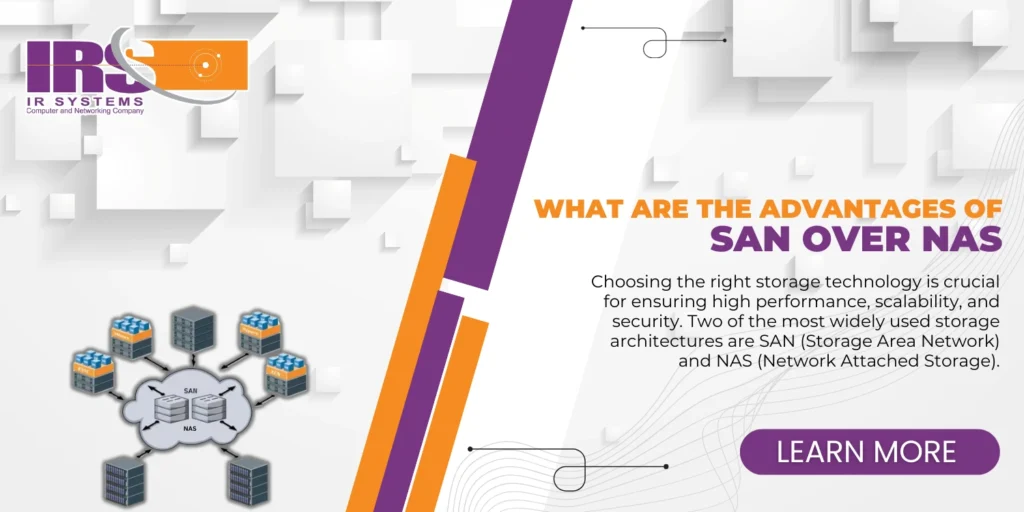
In today’s digital landscape, businesses generate vast amounts of data that require efficient and secure storage solutions. Choosing the right storage technology is crucial for ensuring high performance, scalability, and security. Two of the most widely used storage architectures are SAN (Storage Area Network) and NAS (Network Attached Storage). While both serve essential roles, SAN storage stands out as the preferred choice for enterprises and data-intensive applications. This article explores the advantages of SAN over NAS, highlighting why businesses, especially those looking for backup solutions in Lahore, should consider SAN for backup data storage and high-speed performance. Understanding SAN and NAS: Key Differences Before discussing the advantages of SAN storage, it is important to understand the fundamental differences between SAN and NAS. What Is SAN (Storage Area Network)? A Storage Area Network (SAN) is a dedicated high-speed network that connects storage devices directly to multiple servers, enabling block-level data access. Unlike traditional storage methods, SAN ensures low latency, high reliability, and superior performance by keeping storage traffic separate from standard network operations. Best For: Large enterprises, cloud computing, virtualization, databases, and applications requiring high-speed performance. Common Uses: Financial transactions, healthcare records, e-commerce platforms, and large-scale backup data storage solutions. What Is NAS (Network Attached Storage)? Network Attached Storage (NAS) is a file-based storage system connected to a shared network, allowing multiple users to access files over Ethernet. NAS functions like a centralized file server, making it ideal for simple file sharing and backups. Best For: Small businesses, home users, and organizations needing shared file access. Common Uses: Office document storage, media streaming, and small-scale backup solutions in Lahore. Why Choose SAN Over NAS? Key Advantages of SAN Storage 1. High-Speed Performance and Low Latency SAN storage provides exceptional performance compared to NAS, thanks to its high-speed architecture and block-level access. How SAN Achieves High Performance: Uses Fibre Channel (FC) or iSCSI for ultra-fast data transfers. Bypasses traditional network congestion, ensuring seamless operations. Delivers direct storage access to applications, reducing delays. Why This Matters: Businesses handling big data analytics, real-time transactions, and database management need high-speed access to critical information. SAN storage ensures minimal downtime and maximum efficiency. For example, financial institutions processing thousands of transactions per second cannot afford slow storage speeds. SAN ensures rapid data access, preventing transaction delays. 2. Seamless Scalability Without Performance Bottlenecks As businesses grow, their storage needs increase. SAN storage offers seamless expansion without affecting speed or efficiency. NAS Scalability Limitation: Adding more users or storage can slow down NAS performance due to increased network traffic. SAN Advantage: Easily expandable by integrating additional storage units. Supports thousands of users and massive data volumes without slowdowns. Best suited for organizations requiring continuous data access and storage expansion. 3. Superior Backup and Disaster Recovery Solutions Data loss can be devastating for businesses. SAN storage provides highly efficient backup and disaster recovery solutions to ensure business continuity. Advanced Backup Data Storage Features: Block-level backup enables faster and more efficient data recovery than NAS file-based backups. Snapshot technology allows quick restoration of previous data states. SAN supports real-time replication, ensuring up-to-date backup copies. Disaster Recovery Benefits: Geographically distributed replication ensures data availability in case of system failure. Ideal for backup solutions in Lahore, offering businesses a secure way to store and restore critical information. A large IT firm in Lahore, for example, can prevent data loss by using SAN for continuous replication and high-speed recovery, ensuring minimal downtime during unexpected failures. 4. Dedicated Storage Network for Maximum Efficiency Unlike NAS, which relies on a shared network, SAN operates on a separate high-speed network, ensuring better performance and reliability. Advantages of a Dedicated Storage Network: Eliminates network congestion and prevents slow data access. Provides uninterrupted storage access, even during peak usage hours. Reduces dependence on traditional Ethernet networks, enhancing efficiency. For example, an e-commerce company experiencing high traffic during a sale will benefit from SAN storage because it prevents slowdowns and ensures a seamless customer experience. 5. Enhanced Security and Data Protection Data security is a top priority for businesses handling sensitive information. SAN storage offers advanced security features that reduce the risk of unauthorized access or data breaches. Key Security Benefits of SAN Storage: Encryption capabilities protect data from cyber threats. Role-based access control (RBAC) restricts data access to authorized users only. Built-in redundancy ensures data integrity in case of hardware failures. Industries such as banking, government, and healthcare benefit from SAN security features, ensuring that sensitive data remains protected against cyberattacks and unauthorized access. 6. High Availability and Reliability Downtime can result in significant financial losses for businesses. SAN storage is designed to minimize downtime and ensure maximum reliability. Built-in Redundancy Features: Multiple storage controllers to prevent single points of failure. Automated failover mechanisms to ensure continuous operations. RAID configurations to protect against data loss due to drive failures. Many SAN solutions guarantee 99.999% uptime, making them ideal for mission-critical applications that require constant data access. 7. Optimized for Virtualization and Cloud Environments With the rise of virtualization and cloud computing, businesses need efficient storage solutions that can support multiple virtual machines. Why SAN is Best for Virtualization: Provides high-speed data access for virtual servers. Supports live migration of virtual machines without data transfer delays. Improves overall efficiency in cloud and hybrid environments. For organizations running VMware, Hyper-V, or Kubernetes, SAN storage ensures a smooth and scalable virtualization infrastructure. When Should You Choose SAN Over NAS? SAN storage is the best choice if your business requires: High-speed performance for databases, analytics, and enterprise applications. Scalable storage solutions without impacting speed. Secure backup solutions in Lahore for business continuity. Reliable backup data storage with advanced security features. High availability for mission-critical applications. Seamless virtualization support for cloud-based environments. If your organization deals with large-scale data storage, virtualization, or enterprise workloads, SAN storage is the ideal solution. Final Thoughts While NAS is useful for small businesses and basic file-sharing needs, SAN storage provides unmatched performance, security, scalability, and reliability, making it the preferred choice for enterprises. For businesses in
Boost Business with SAN Storage & Backup
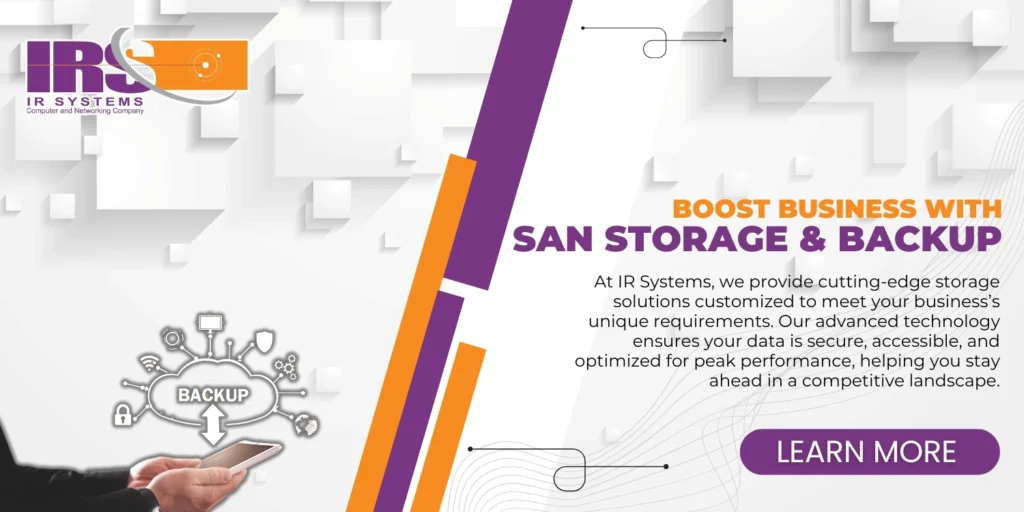
In today’s fast-paced digital era, businesses are constantly managing and processing massive volumes of data daily. Efficient data storage and robust security are essential to keep operations running smoothly and prevent costly downtime. Storage Area Network (SAN) storage is a high-performance solution designed to help enterprises manage, store, and protect their data effectively. At IR Systems, we provide cutting-edge storage solutions customized to meet your business’s unique requirements. Our advanced technology ensures your data is secure, accessible, and optimized for peak performance, helping you stay ahead in a competitive landscape. Trust us to deliver reliable, scalable storage solutions that empower your business to thrive. What is a Storage Area Network (SAN), and Why Should It Be Used? Storage Area Network (SAN) storage is a high-speed, dedicated network that provides access to consolidated block-level storage. Unlike traditional storage methods, SAN enhances data availability, reliability, and performance for businesses. Key benefits include: High-Speed Performance – Ensures quick data access and reduces latency. Scalability – Allows businesses to expand storage capacity as needed. Data Redundancy – Offers failover protection and disaster recovery. Enhanced Security – Ensures restricted access and data protection. Improved Efficiency – Reduces bottlenecks and enhances overall system performance. With these features, SAN storage is the preferred choice for businesses looking to optimize their IT infrastructure and enhance data security. The Essential Guide to Enterprise Data Security and Continuous Business Growth Data security is at the core of modern business operations. Without secure data storage, organizations risk data breaches, compliance issues, and financial losses. SAN storage plays a vital role in enterprise security by: Providing Data Encryption – Protects sensitive information from unauthorized access. Offering Redundancy & Backups – Prevents data loss through replication and failover mechanisms. Enabling Quick Data Recovery – Minimizes downtime in case of failures. Supporting Secure Remote Access – Ensures authorized personnel can access critical data from anywhere. Enhancing Disaster Recovery Strategies – Provides seamless recovery options for business continuity. By implementing a reliable backup solution, businesses can safeguard their operations and ensure continuous growth without disruptions. Backup Solutions: Ensuring Data Protection and Business Continuity A well-structured backup solution is critical for businesses relying on data-driven operations. Key components of effective backup solutions include: Automated Backups – Schedule regular backups to prevent data loss. Cloud Integration – Store backup copies offsite for additional security. Disaster Recovery Plans – Ensure data retrieval in case of system failures. Scalable Storage – Adapt to business growth without compromising security. Data Replication & Mirroring – Enhance data availability and redundancy. Investing in backup solutions ensures that businesses remain resilient against cyber threats and unexpected system failures. Understanding Variations in SAN Storage Systems When choosing a Storage Area Network solution, understanding its variations is essential. Businesses can opt for: Fibre Channel (FC) SAN – High-speed, low-latency storage connectivity ideal for large enterprises. iSCSI SAN – Cost-effective and suitable for small to mid-sized businesses. NVMe-oF SAN – Ultra-fast data transfer with minimal latency for high-performance applications. Hybrid SAN Solutions – Combining multiple technologies for customized storage needs. Each variation offers specific advantages, helping businesses select a storage solution that aligns with their operational requirements and budget. Exploring Qsan Storage for Business Efficiency Qsan Storage is an industry-leading Storage Area Network solution known for: Performance Optimization – Enhancing storage speed and efficiency. Robust Security – Offering advanced data protection features. Scalability – Growing with business demands without disruption. Cost-Effectiveness – Providing enterprise-grade features at a competitive price. Intelligent Data Management – Simplifying data handling through automated tools. Businesses looking for a high-performance storage solution can rely on Qsan Storage for secure and efficient data management. Why Choose IR Systems for Your SAN Storage Needs? At IR Systems, we provide cutting-edge Storage Area Network solutions designed to meet enterprise demands. Our solutions ensure: Seamless Integration – Compatible with existing IT infrastructure. Customizable Storage Options – Tailored to business-specific requirements. Reliable Backup Solutions – Ensuring data protection and quick recovery. Expert Consultation & Support – Providing ongoing technical assistance and training. Scalable & Future-Proof Solutions – Designed to grow alongside your business. Visit IR Systems today to explore our offerings and find the perfect storage solution for your business. FAQs on SAN Storage & Backup Solutions What is the main advantage of SAN storage? SAN storage provides high-speed, scalable, and secure data storage, ensuring efficient business operations. How does SAN storage differ from NAS storage? SAN operates at the block level for fast performance, while NAS storage works at the file level for easier data sharing. Are backup solutions necessary for SAN storage? Yes, implementing backup solutions ensures data protection and quick recovery in case of system failures. What industries benefit the most from SAN storage? Industries such as finance, healthcare, IT services, and manufacturing rely on SAN storage for secure, high-speed data management. How can IR Systems help with SAN storage? At IR Systems, we offer customized Storage Area Network solutions and data recovery plans to enhance business efficiency and security. Conclusion Ensuring secure and efficient data management is essential for business growth. SAN storage offers high-speed performance, scalability, and robust security, making it a vital solution for enterprises. At IR Systems, we provide tailored backup solutions and flexible storage options to safeguard your critical data and enhance operational efficiency. Our expert team helps businesses integrate reliable storage systems that prevent data loss and downtime. Whether you need enterprise data security or seamless expansion, we have the right solution for you. Contact Us today and discover how our advanced storage solutions can support your business success!
